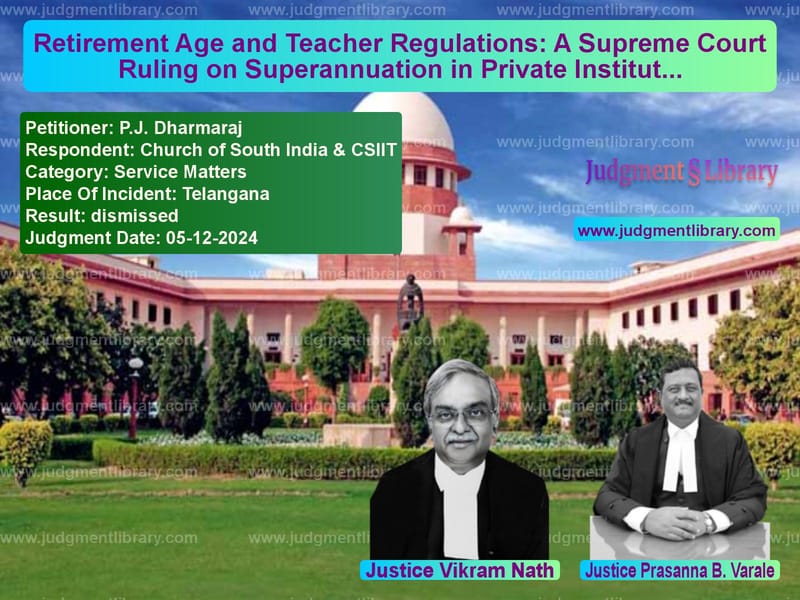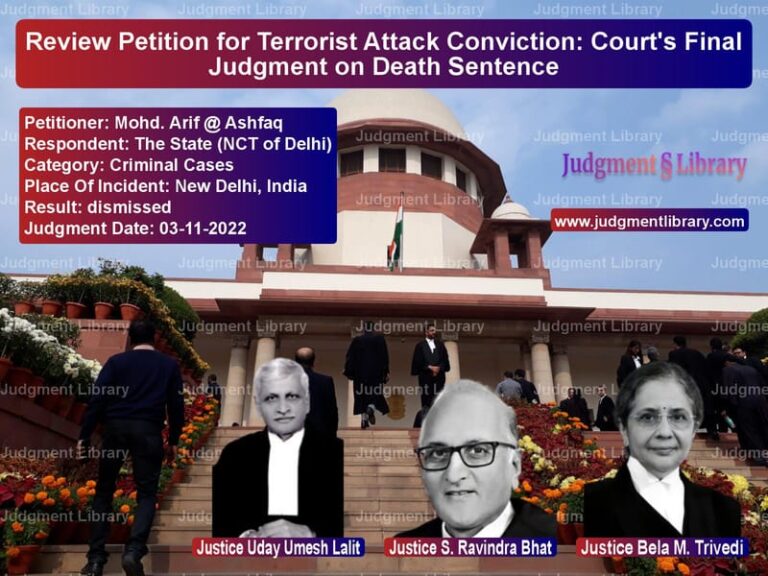Retirement Age and Teacher Regulations: A Supreme Court Ruling on Superannuation in Private Institutions
The Supreme Court in the case of P.J. Dharmaraj vs. Church of South India addressed a crucial issue regarding the age of superannuation for educational employees in private institutions. The judgment, delivered on December 6, 2024, involved the appellant’s claim for continuing in service until the age of 65 after the implementation of revised UGC and AICTE regulations in 2010. The appellant, P.J. Dharmaraj, had worked as the Director of the CSI Institute of Technology (CSIIT), which is an unaided minority institution affiliated with the Jawaharlal Nehru Technological University (JNTU). The issue revolved around whether the appellant was entitled to continue in service beyond the statutory age of 60, based on the revised UGC regulations that set the retirement age at 65 for teachers.
Background of the Case
The appellant, P.J. Dharmaraj, had been appointed as the Director of CSIIT in November 1998, with the retirement age as per AICTE and UGC regulations at that time being 60 years. However, in 2010, AICTE and UGC issued amended regulations that increased the age of superannuation for teaching staff in technical institutions to 65 years. The appellant, who was promoted to the post of Professor during his tenure, argued that the revised regulations should apply to him as well, extending his service till 65. Despite this, he was relieved from his post as Director on August 14, 2018, and replaced by another individual, Respondent No.4.
Following his removal, the appellant filed a representation requesting continuation in service until the age of 65, citing the 2010 amendments to the regulations. This request was rejected by CSIIT in December 2018, after which the appellant approached the High Court of Telangana. The High Court dismissed his writ petition, holding that the age of superannuation for teachers in JNTU and affiliated colleges, including CSIIT, remained at 60 years. The appellant then appealed to the Supreme Court.
Legal Issues Raised
- Whether the revised age of superannuation to 65 years, as per the UGC and AICTE regulations of 2010, is applicable to the appellant despite his role being administrative and not teaching-based.
- Whether the appellant, appointed as Director in 1998, is entitled to the benefit of the revised regulations based on his earlier appointment and the binding nature of UGC and AICTE guidelines.
- Whether the appellant’s acceptance of his retirement at the age of 60, following representations and agreements with CSIIT, bars him from seeking an extension based on the revised regulations.
Arguments Presented
Arguments by the Appellant (P.J. Dharmaraj)
- The appellant argued that when he was appointed in 1998, the regulations stipulated that the age of superannuation for faculty members was 60 years. However, after the amendment in 2010, the revised age limit of 65 years was applicable to all teaching staff in technical institutions.
- He further contended that despite being assigned administrative duties as Director, he was still entitled to the benefit of the amended regulations as they applied to academic staff in technical institutions.
- The appellant also relied on previous Supreme Court judgments and UGC and AICTE guidelines to argue that the revised retirement age should be extended to all faculty, including directors, in light of the revised rules.
Arguments by the Respondents (Church of South India & CSIIT)
- The respondents argued that the appellant was appointed as Director, a post that primarily carried administrative duties, and was not directly involved in teaching. As such, the revised UGC regulations, which pertain to teaching staff, did not apply to the appellant.
- The respondents also highlighted that CSIIT is a private, unaided minority institution and operates under the rules prescribed by the State of Telangana, which did not adopt the 2010 amendments raising the retirement age to 65 years.
- Additionally, the respondents argued that the appellant had already accepted his retirement at 60 years of age and had made representations regarding his retiral benefits, thus acknowledging his retirement at the age of 60.
Supreme Court’s Observations
On the Application of Revised Regulations
The Supreme Court analyzed whether the revised UGC and AICTE regulations, which increased the age of superannuation for teachers in technical institutions, applied to the appellant. The Court observed:
“While the appellant was appointed before the revised regulations came into effect, the amendment to the superannuation age applies to all faculty members in technical institutions, irrespective of whether they hold administrative roles. However, since the appellant was not involved in teaching and was primarily engaged in administrative duties, the benefit of the revised superannuation age may not apply to him in the same manner as it would to a regular academic staff member.”
On the Role of the Appellant as Director
The Court discussed the distinction between teaching and administrative roles and its relevance to the appellant’s case. The Court noted:
“The appellant’s role as Director of CSIIT, while important, was an administrative one, and he did not meet the definition of a ‘teacher’ under the AICTE and UGC regulations. Therefore, the benefit of the revised age of superannuation as applicable to teaching staff does not automatically extend to him, given his administrative duties.”
On the Acceptance of Retirement
The Court considered the appellant’s actions after being notified of his retirement and his subsequent representations regarding retirement benefits. The Court held:
“The appellant’s continued representations for retiral benefits and his engagement with CSIIT regarding his post-retirement entitlements suggest that he acknowledged his retirement at the age of 60. Having accepted the terms of his retirement and the benefits associated with it, the appellant cannot now seek to change those terms based on the revised regulations.”
Final Verdict
- The Supreme Court dismissed the appeal and upheld the High Court’s decision. The Court ruled that the appellant was not entitled to the benefit of the revised superannuation age of 65 years due to his non-teaching administrative role and his acceptance of the terms of his retirement at 60 years.
- The Court emphasized that the revised regulations could not be applied retroactively in the absence of any specific provision extending the benefit to individuals in non-teaching administrative roles like the appellant.
- In conclusion, the Court found that the appellant’s retirement at 60 years was in line with the regulations applicable to the State of Telangana and the JNT University, and there was no legal basis for extending the revised age of superannuation to the appellant in this case.
Implications of the Judgment
- Clarification on Teacher Regulations: This ruling clarifies the applicability of revised superannuation age limits in technical institutions and draws a distinction between teaching and administrative roles in academic settings.
- Affirmation of Institutional Autonomy: The decision emphasizes the importance of respecting institutional autonomy, particularly in private educational institutions that are not bound by the amended UGC and AICTE regulations unless explicitly adopted.
- Setting Precedent for Future Cases: This judgment sets a precedent for cases involving the application of amended regulations on superannuation in the context of administrative positions in academic institutions.
- Implications for Private Educational Institutions: The ruling reaffirms that private institutions, especially minority-run institutions, can have their own policies regarding the age of superannuation, provided they align with applicable state laws.
The judgment reflects the Court’s careful consideration of the distinct roles played by faculty members and administrators, as well as the regulatory framework governing superannuation in educational institutions.
Petitioner Name: P.J. Dharmaraj.Respondent Name: Church of South India & CSIIT.Judgment By: Justice Vikram Nath, Justice Prasanna B. Varale.Place Of Incident: Telangana.Judgment Date: 05-12-2024.
Don’t miss out on the full details! Download the complete judgment in PDF format below and gain valuable insights instantly!
Download Judgment: p.j.-dharmaraj-vs-church-of-south-indi-supreme-court-of-india-judgment-dated-05-12-2024.pdf
Directly Download Judgment: Directly download this Judgment
See all petitions in Employment Disputes
See all petitions in Public Sector Employees
See all petitions in Workplace Harassment
See all petitions in Judgment by Vikram Nath
See all petitions in Judgment by Prasanna Bhalachandra Varale
See all petitions in dismissed
See all petitions in supreme court of India judgments December 2024
See all petitions in 2024 judgments
See all posts in Service Matters Category
See all allowed petitions in Service Matters Category
See all Dismissed petitions in Service Matters Category
See all partially allowed petitions in Service Matters Category







